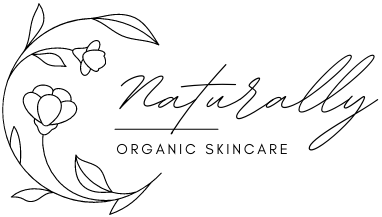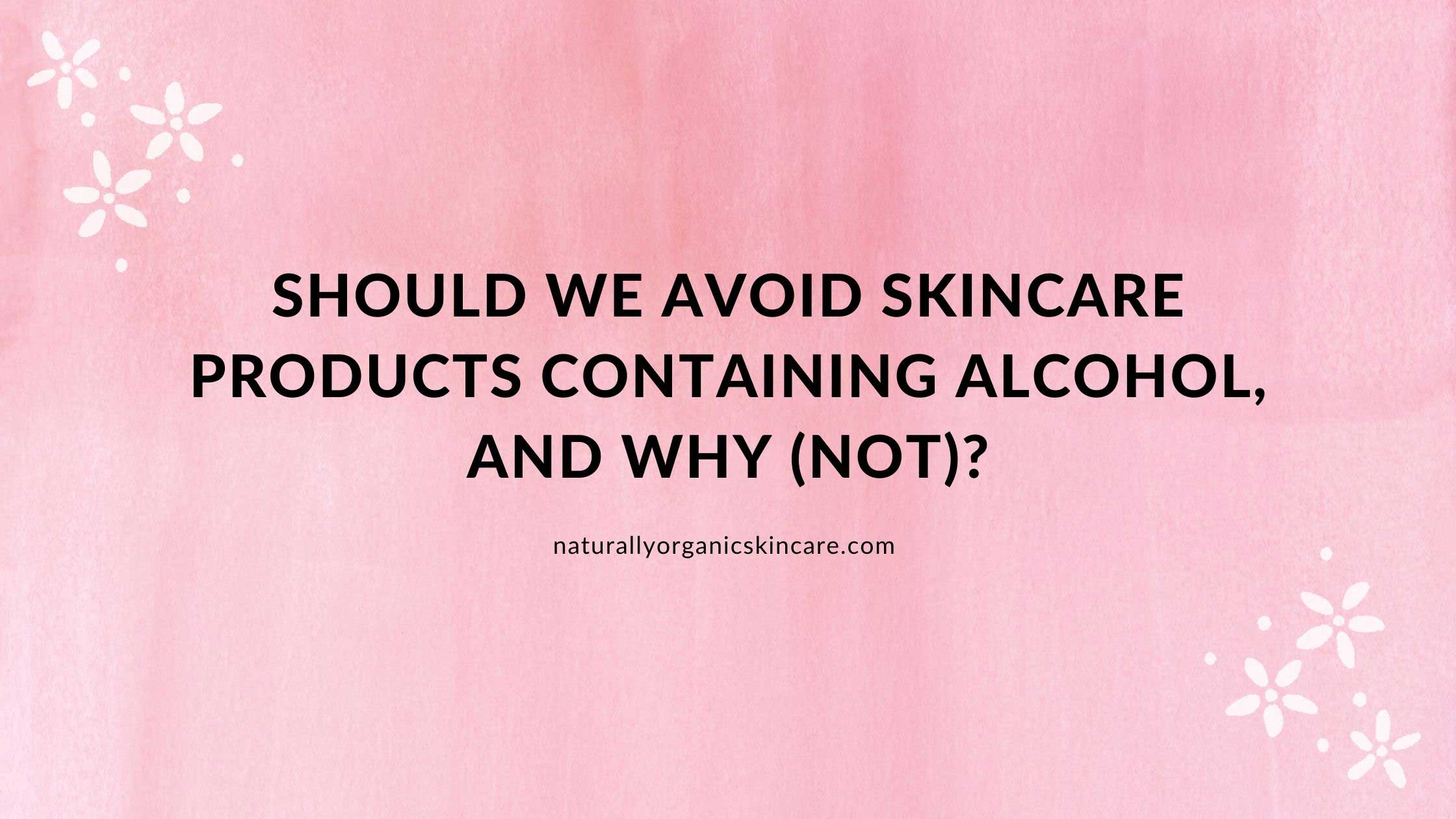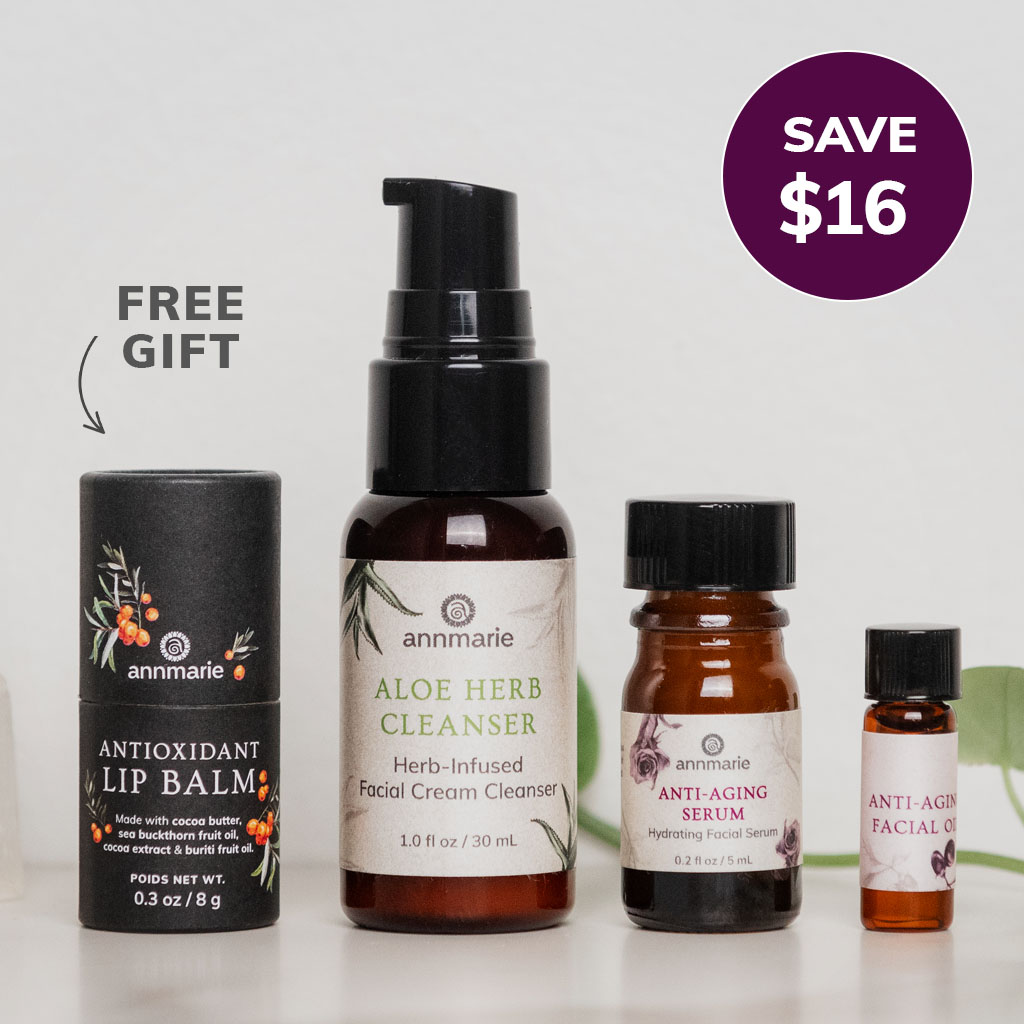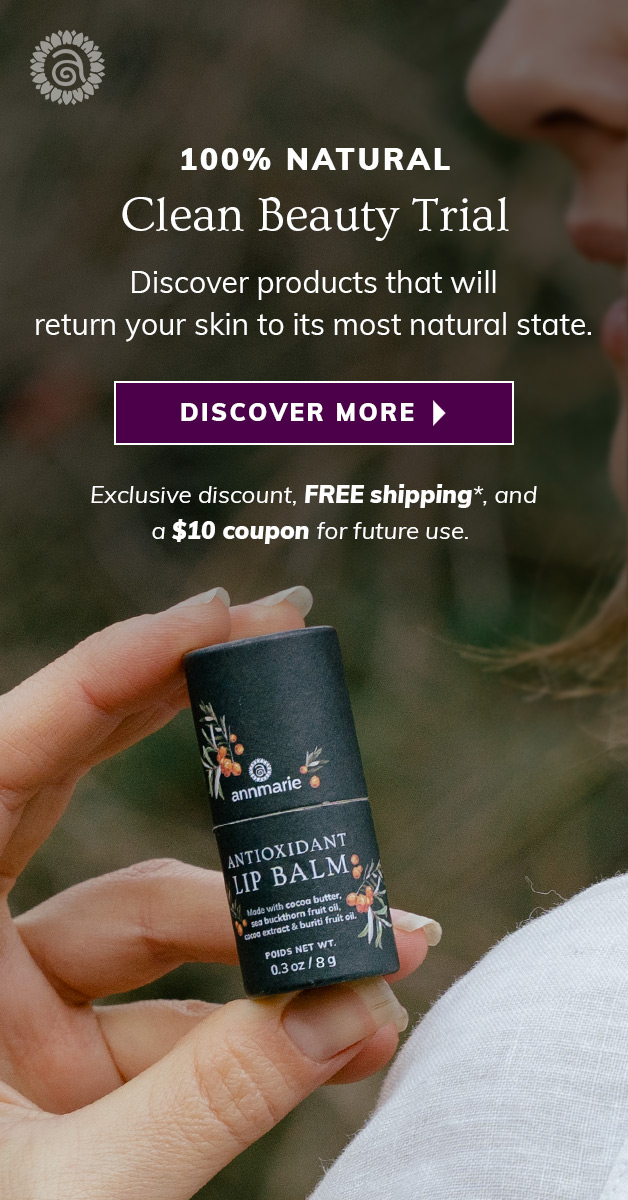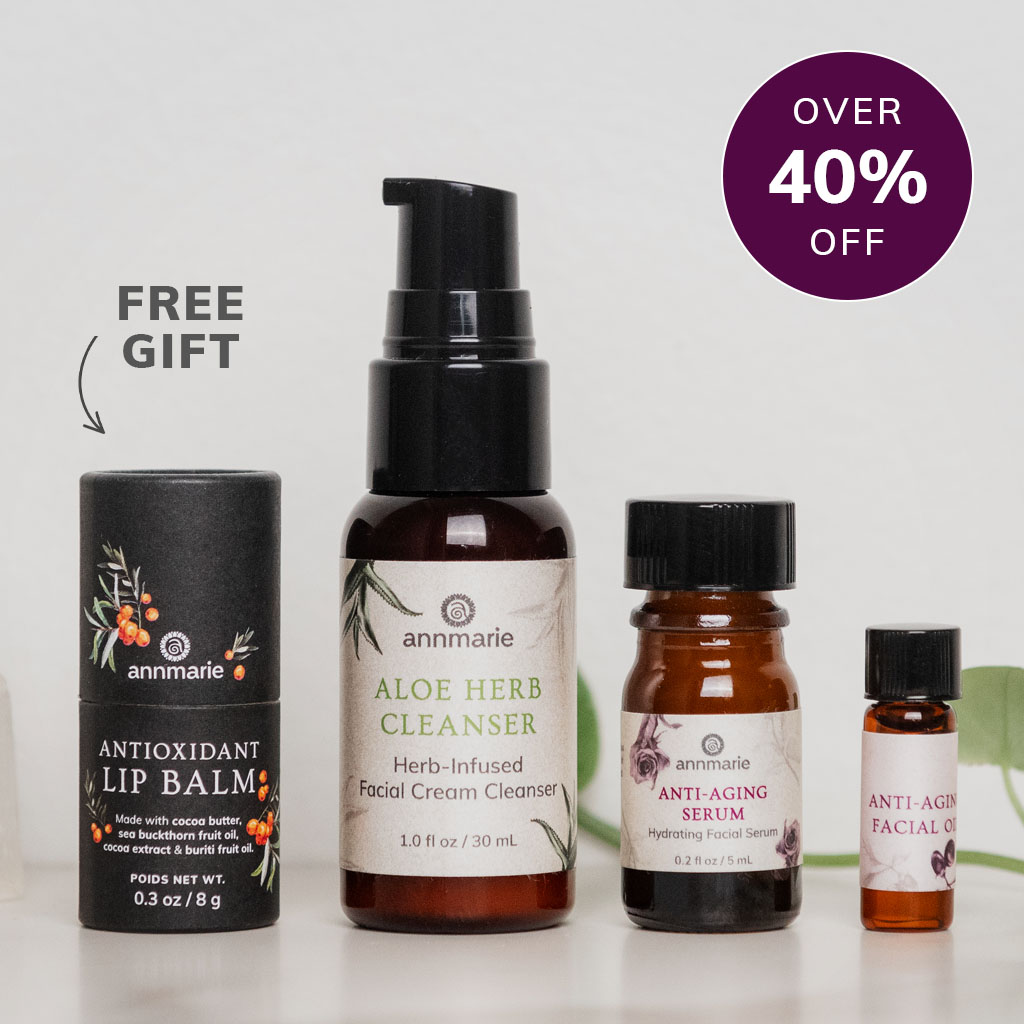Alcohol is on the ingredient list of many skincare and cosmetic products. Whether alcohol as an ingredient is bad for the skin, harmless, or even beneficial, is one of the more confusing ingredient-related topics. In this article, I’m making a pass at clarifying the confusion around good vs bad alcohol in skincare.
My aim here is to not overcomplicate things. It’s from the perspective of someone who is not an expert; if you aren’t either, this shouldn’t bother you – on the contrary. 😉
Because guess what? Dermatologists, chemists, and other professionals in the field don’t seem to unanimously agree on this one. And if those who are in the business of healthy skin don’t agree, how the heck is a layperson supposed to make sense of it?
Comparing alcohol and oranges
One good thing to know is that there are various types of alcohol. They’re about as different as apples and oranges. Regular alcohol is not at all the same thing as a fatty alcohol. Something to keep in mind, before getting nervous about the alcohol you’ll find in skincare products: those experts who say alcohol in skincare is bad for the skin are not talking about fatty alcohols.
Chemically speaking, alcohol (such as ethanol) and fatty alcohols are very different substances. One is what we typically think of – we being us laypersons and non-chemists – when hearing the term alcohol. The other, so-called “fatty alcohols” (also called long-chain alcohols) are something else entirely.
Fatty alcohols
Fatty alcohols do carry the name but are unlike anything we tend to think of when we hear the term alcohol.
Fatty alcohols are not harsh on the skin, quite the contrary – they have a beneficial effect. When you see cetyl alcohol or cetearyl alcohol in the ingredient list, those substances are part of the fatty alcohol family. Now I don’t mean to start a chemistry class here, so that’s about as far as we’ll take the subject. On skincare ingredient lists and labels, you may run into them under the names lauryl alcohol, stearyl alcohol, or oleyl alcohol. At least experts agree on this one: fatty alcohols get a unanimous thumbs up. One less thing to be confused about.
Alcohol (ethanol)
Regular alcohol, when plant-based, is a by-product of fermentation. It doesn’t get any less glamorous than this: alcohol is nothing other than the farts of yeast.
Denaturated alcohol is alcohol, made undrinkable. Yup, that’s right: for the sole purpose of limiting its use as an intoxicating beverage, denaturated alcohol is regular alcohol (ethanol) plus a poisonous and/or a nasty-tasting substance.
Alcohol, ethanol, and methanol are all different kinds of alcohol (and there are more). Ethanol can be made from plants, or it can be synthesized in the petrochemical industry. Ethanol derived from petroleum contains a few percent of methanol, which makes it toxic when ingested.
Natural skincare brands like Weleda and Dr. Hauschka use natural (and even organic) alcohol in their products. In natural skincare, you’ll often see the origin of the alcohol used specified on the label. It usually says something like “organic ethanol”, or “alcohol, plant-based/derived”. If on the ingredients list of a mainstream skincare product it just mentions “alcohol”, with or without the term “denatured/denat.”, there is no way to know whether this refers to the synthetic or natural type of alcohol.
Aromatic alcohols
Aromatic alcohols or phenols also deserve their own separate paragraph. Skipping the chemistry class (again) and jumping straight to what applies to skincare, two aromatic alcohols often found in skincare products are benehyl alcohol and benzyl alcohol. They’re there for one or more of the following: as a fragrance component, preservative, solvent, and/or viscosity-decreasing agent.
Because of their desinfectant nature, phenols such as benzyl alcohol are equally widely used in the medical world.
As far as skincare goes, these substances are considered safe in the small concentrations that they’re typically present in any given formulation. However, they are also known to be responsible for skin irritation and allergic reactions.
Good vs Bad Alcohol in Skincare, vs Any Alcohol at All: Opposing Sides
Some experts vote for the use of alcohol in skincare, for what sounds like the same reason others are against it: the way alcohol creates small openings in the top layers of the skin.
While one side of the panel insists that this destructive property of alcohol is bad and gradually destroys the skin, the opposite side argues that alcohol as part of a properly formulated skincare product works as a penetration enhancer.
They claim that it is precisely through those microscopic openings that other beneficial ingredients make it to their destination, deeper in the skin. Their stance is that as a living and constantly changing organism, the skin has no problem regenerating from those tiny abrasions.
Who is right, and who’s wrong?
Can both be true? Neither arguments have to be completely false.
Alcohol as a main ingredient in skincare and cosmetics is probably not the best. At the same time, when looking closely at some of the latest preservatives, their potential side effects don’t exactly inspire confidence either (more on that below) – yet we’re hearing very few experts calling those out. Until they do, I suppose?
Applying alcohol to the skin to disinfect, sterilize, or prevent infection is an obvious exception and a perfectly good thing from a medical perspective. The brunt of people will be grateful for the opportunity to have a medical procedure – or inoculation – in modern, sanitary conditions. If alcohol can contribute to the success of some life-improving or life-saving interventions, nobody in their right mind is going to complain that it may be harsh on the skin or cause premature aging.
Advantages of using alcohol in cosmetics
Some natural and organic skincare brands rely heavily on alcohol. They only use the most natural kind (of course), derived from organically grown plant material. Including alcohol in their creams and lotions means they can stay out of the controversial debate about synthetic preservatives, while still offering products with a decent shelf-life.
Alcohol used in for example Weleda and Dr. Hauschka skincare acts as a preservative (and probably also as an emulsifier, but that’s a different topic). It is completely natural, and efficiently prevents the brewing of nasty fungi or bacteria.
Synthetic preservatives instead of alcohol
Paula Begoun, one of the loudest voices against the use of alcohol in skincare, relies on the preservatives Hexylene Glycol, Ethylhexylglycerin, and Phenoxyethanol in her line of products. Paula Begoun’s skincare has a fairly large following, but not all reviews are positive. The ingredients overall aren’t all that natural, let alone organic. (They are cruelty-free, though, which is great.)
Not Just Good vs Bad Alcohol in Skincare, but also How Much
There is one thing a lot, if not most, experts seem to agree upon: the amount of alcohol used in given cosmetic concoction matters.
Ingredients are listed in order of the amount present in the product. Alcohol popping up as one of the first ingredients means there’s rather a large amount of it present in the formula, but if alcohol is located somewhere in the tail of the list, it’s a different story.
Even the anti-alcohol brigade admits that there isn’t much to be concerned about if your favorite skincare product contains a little bit of alcohol. It can still be an issue, if you are sensitive to it, and also depend on the type of alcohol.
Benzyl alcohol is almost always in the last lines of ingredient labels, and may still cause sensitivity. Benzyl alcohol does exist in nature and can be derived from plants, but many brands use the synthetic version instead.
Good vs Bad Alcohol in Skincare – Bottom Line
Since we’ve put parabens on the naughty list, ethylhexylglycerin has taken their place as a widely used skincare preservative. Many natural and organic skincare brands use it too. The substance is only rated a 2 by the EWG. However, it has been linked to severe eye damage, liver toxicity, skin irritation, and contact dermatitis, as well as being harmful to aquatic life with long-lasting effects.
So is using plant-derived alcohol as a natural alternative to synthetic preservatives really worse?
While there is some evidence that alcohol contributes to premature skin aging and disrupts the healthy balance of the skin’s outer layer, I’m not so sure which one is the better option.
And here’s Paula Begoun as the example again: as someone who screams the loudest that alcohol is a most terrible disruption to the skin’s naturally balanced environment, Paula Begoun skincare sure uses a whole lot of synthetic ingredients in their line. This confuses me. The creators of skincare containing lots of synthetics and petrochemicals pointing out that alcohol disrupts the natural balance of the skin…? Petrochemicals and synthetics in skincare have definitely caused issues for my skin in the past. Natural products with (plant-derived) alcohol have not.
The natural, organic skincare brands that do use alcohol in their formulations believe that it does not have a nefarious effect on the skin. Of course, they aren’t necessarily or automatically right about everything, just because their products are all-natural. However, my skin has shown to prefer the all-natural approach, alcohol included.
The tug of war on the alcohol front isn’t anywhere close to being resolved. I realize you were hoping for a more concrete conclusion at the end of this article, but it basically is up to each one of us to choose which one of the above concepts makes us the least uncomfortable. And observe how your skin reacts to one or the other.
The good news is that it isn’t a matter of using skincare that contains synthetic chemicals (but no alcohol) or using natural skincare with (natural) alcohol. If you want to go both natural and alcohol-free, you can choose natural and organic skincare from brands that don’t use alcohol at all in their formulations.
Natural & Organic Skincare Brands That May Contain Some Alcohol
- Weleda
- Dr. Hauschka
- Madara
- 100% Pure
Natural & Organic Skincare Brands Without Alcohol
- Annmarie Gianni
- Aurelia (This link contains the refer-a-friend discount of 25% off first orders over $50.)
- Pai (Same here, except that the refer-a-friend discount is even better: $25 off your first order over $50.)
